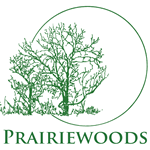This past weekend, Prairiewoods held our annual conference, Spirituality in the 21st Century. Our facilitator, mythologist Sharon Blackie, used a fairytale as a focal point for the themes we discussed. The tale, “The Handless Maiden,” tells the story of an innocent young woman whose hands are cut off to protect her frightened father, who has made a foolish bargain with a devil. The maiden then sets off on a journey and, after many experiences, flees into the forest where she finds solace and her true self—resulting in the healing of her deep wound. Her hands grow back—the maiden quite literally re-members and becomes the woman she is meant to be.
 According to Sharon Blackie, we are all suffering from a great wound—our severance from the natural world. As we discussed what might be involved in our own re-membering, the healing of our own—and the world’s—deep wound, we could not help but reflect on the coronavirus pandemic as part of our collective journey into the forest. James Hillman, the father of archetypal therapy, thought of imagination as an act of soul-making. Imagining what we might learn on this path through pandemic, what world might be waiting for us if we find our way into the deep forest and discover a place of more-than-physical healing, feels like an empowering act at a time when we are surrounded by, and could easily give in to, our fears.
According to Sharon Blackie, we are all suffering from a great wound—our severance from the natural world. As we discussed what might be involved in our own re-membering, the healing of our own—and the world’s—deep wound, we could not help but reflect on the coronavirus pandemic as part of our collective journey into the forest. James Hillman, the father of archetypal therapy, thought of imagination as an act of soul-making. Imagining what we might learn on this path through pandemic, what world might be waiting for us if we find our way into the deep forest and discover a place of more-than-physical healing, feels like an empowering act at a time when we are surrounded by, and could easily give in to, our fears.
The next day, a friend who had been at the spirituality conference shared a thought piece by one of last year’s Spirituality in the 21st Century facilitators, Charles Eisenstein. In his article titled “The Coronation,” Eisenstein also discusses the world that we can imagine into being—the world his book title The More Beautiful World Our Hearts Know is Possible references. The article, like the conference with Sharon Blackie, is rich with ideas and energizing possibilities for healing our great wound, for re-membering. In musing on the choice of love over fear, for example, Eisenstein says:
“Please don’t think that choosing love over fear can be accomplished solely through an act of will, and that fear too can be conquered like a virus. The virus we face here is fear, whether it is fear of Covid-19, or fear of the totalitarian response to it, and this virus too has its terrain. Fear, along with addiction, depression, and a host of physical ills, flourishes in a terrain of separation and trauma: inherited trauma, childhood trauma, violence, war, abuse, neglect, shame, punishment, poverty, and the muted, normalized trauma that affects nearly everyone who lives in a monetized economy, undergoes modern schooling, or lives without community or connection to place. This terrain can be changed, by trauma healing on a personal level, by systemic change toward a more compassionate society, and by transforming the basic narrative of separation: the separate self in a world of other, me separate from you, humanity separate from nature. To be alone is a primal fear, and modern society has rendered us more and more alone. But the time of Reunion is here. Every act of compassion, kindness, courage, or generosity heals us from the story of separation, because it assures both actor and witness that we are in this together.”
As we ended the Spirituality in the 21st Century event, Sharon asked us to consider: what act of re-membering will you commit to? Charles asks us the same thing: how will we act to heal from the story of separation?
—Jenifer Hanson, Prairiewoods director


